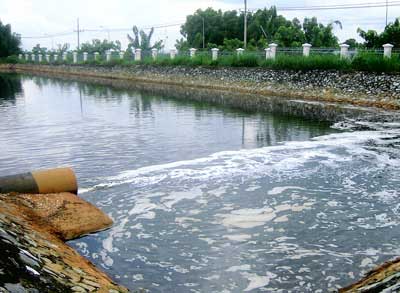
|
| llustrative image. (Photo: Internet) |
Lien's announcement came after the provincial People's Committee publicly announced a list of 11 violating businesses, but failed to apply effective measure to tackle the problem.
Deteriorating environments in residential areas neighbouring the province's 15 industrial areas and craft villages remain a concern amongst local people.
Dong Dinh industrial area in Nghia Hanh District's Cho Chua Township, in operation since 2006, is an example. Without treatment facilities, enterprises in the complex have surcharged their wastewater directly into the environment.
Ironically, a sewage system was designed for the area, but as the zone's Deputy Managing Director Phan Anh Tuan said, lack of investment has translated into sluggish construction.
Five enterprises in the Binh Nguyen Industrial Area have caused noise and dust pollution as well as affected local running water over a period of eight years, resulting in 23 nearby farming households suffering from itchy hands and feet as well as decreased crop productivity.
Despite local petitions sent to relevant bodies, the situation remains unchanged.
Elsewhere in Mo Duc District's Duc Nhuan Commune, home to more than 60 brick kilns, the air is seriously polluted.
Local resident Bui Thi Hay, 74, claimed the kilns have existed for decades and have made their lives terrible.
"There is dust everywhere. We have to keep our doors closed all day," she added.
"Whenever the kilns operate, dust and the smell of coal choke us."
According to a Vietnam News Agency reporter in Quang Ngai, the violating enterprises operate on a small scale with investments between VND5-7billion (US$238,000-330,000) which leave them little to spare on environmental protection.
While provincial organisations are preparing measures to control enterprises, local people continue to suffer from environmental pollution.
VietNamNet/Viet Nam News